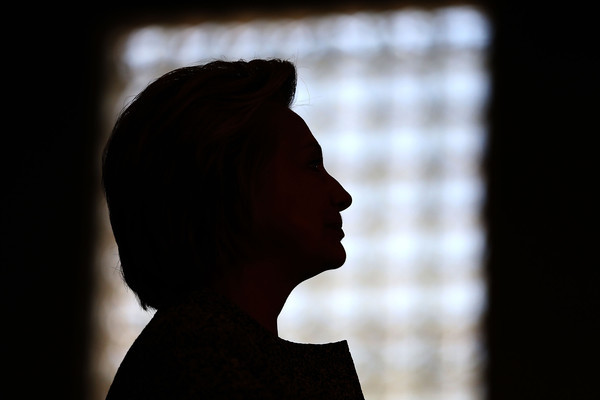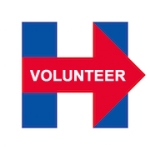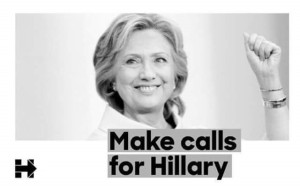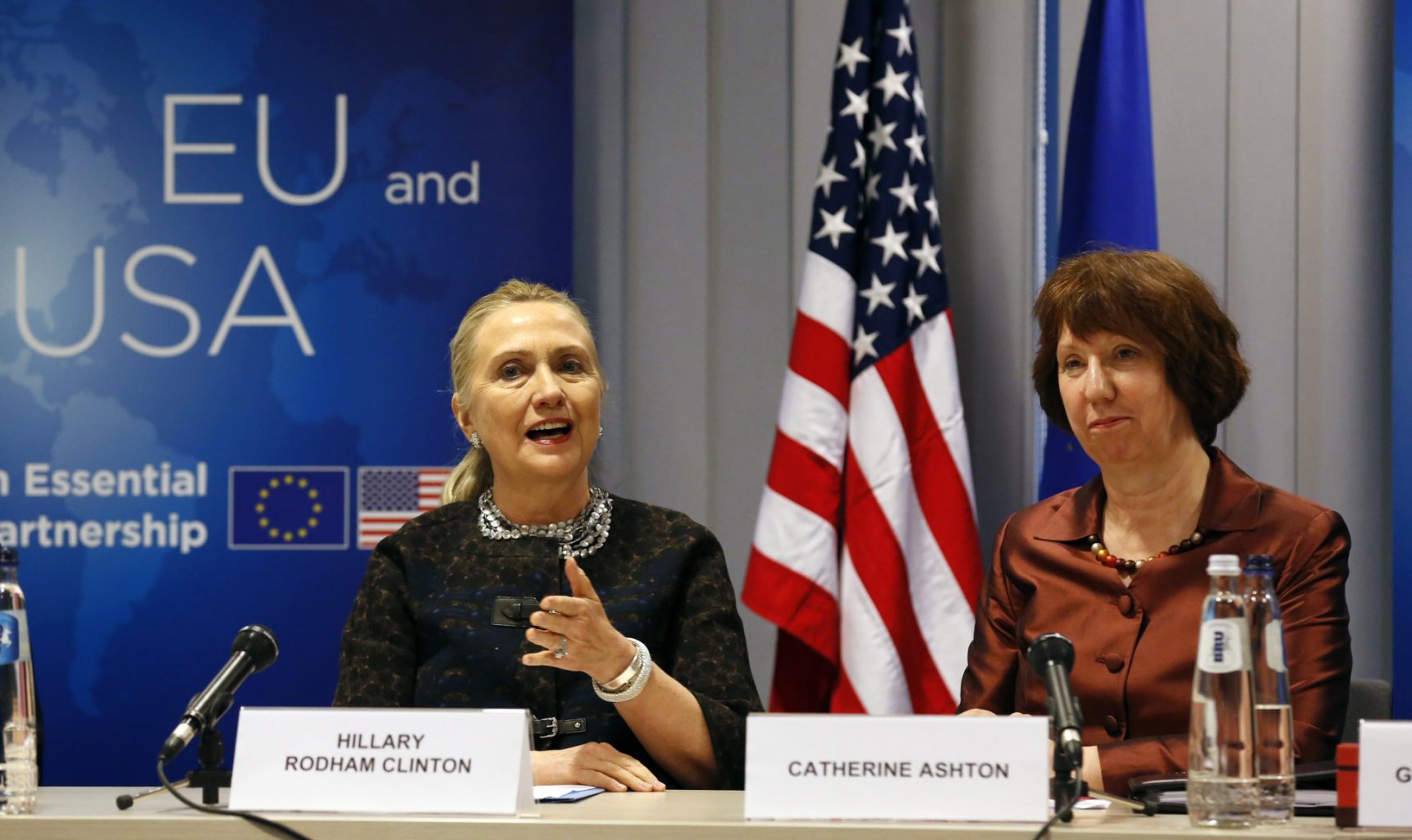SECRETARY CLINTON: Good afternoon, everyone. And it is, as always, a delight to welcome High Representative Ashton back to the State Department for the continuing consultations that we have been engaged in ever since her appointment. I always look forward to these meetings and working closely with her and her team on the full range of shared challenges that confront the United States and the European Union. I think it goes without saying that this is such a consequential partnership that is rooted in our common values and aspirations as well as serving as a cornerstone for global peace and prosperity and security. Today, once again, we covered a lot of ground. Let me just touch on a few of the issues.
First, Lady Ashton and I discussed events in Syria. The United States strongly condemns Syria’s failure to protect diplomatic facilities in Damascus, including the American and French embassies and our ambassador’s residence. As we have expressed directly to the Syrian Government today, we demand that they meet their international responsibilities immediately to protect all diplomats and the property of all countries. The Asad regime will not succeed in deflecting the world’s attention from the real story unfolding in Syria. This is not about America or France or any other country; this is about the legitimate aspirations of the Syrian people for dignity, universal rights, and the rule of law.
Despite promising dialogue and promises of change, the Syrian Government has responded to the people’s peaceful protests with more violence, more arrests, and more intimidation. These assaults must stop. Neither the Syrian people nor the international community will accept half-measures or lofty speeches. We call on the regime immediately to halt its campaign of violence, pull its security forces back from Hama and other cities, and allow the Syrian people to express their opinions freely so that a genuine transition to democracy can take place.
Let me also add that if anyone, including President Asad, thinks that the United States is secretly hoping the regime will emerge from this turmoil to continue its brutality and repression, they are wrong. President Asad is not indispensible, and we have absolutely nothing invested in him remaining in power. Our goal is to see that the will of the Syrian people for a democratic transformation occurs.
Let me turn now to Libya, which again, Lady Ashton and I discussed in preparation for the upcoming Contact Group meeting in Istanbul. We will be joined there by a growing number of international partners reflecting deep and widespread concern about the safety of Libyan civilians and the clear need for Colonel Qadhafi to leave power. As momentum continues to build in Libya, the people are not waiting to plan their new post-Qadhafi future. They are laying the foundation, organizing the institutions, and preparing the infrastructure, and the international community will support these efforts. So the United States welcomes the EU’s announcement that it is opening an office in Benghazi. Together, we will work with the UN and other partners to coordinate post-conflict assistance and help a free Libya emerge from the dictator’s shadow.
We also discussed our shared commitment to support the democratic transitions underway in Egypt and Tunisia. As I said at the Community of Democracies in Lithuania, established democracies have a responsibility to help those emerging find their footing. So we are working together to help Egyptians and Tunisians begin the slow, hard work of building sustainable democracies rooted in guaranteed human rights, accountable institutions, and the rule of law.
And finally, although we talked about many other issues, let me just mention our shared desire to support the countries of the Western Balkans as they continue to build prosperous, peaceful, and democratic societies and move toward their rightful places as full members of the European and Euro-Atlantic community. The recent agreements between Kosovo and Serbia in the EU-facilitated dialogue are a positive and mutually beneficial step. But this is only the beginning. Now the agreements need to be implemented, and we need to see more progress, particularly in the north of Kosovo. We expect both sides to continue their hard work and come to practical agreements to improve the daily lives of all people, normalize relations, and bring both countries closer to achieving their EU aspirations.
So as you can see, we had, as we always do, a lot to talk about, and of all these critical challenges, it is especially gratifying that the United States and the European Union are working hand in hand. And so again, let me thank the high representative, my friend and colleague, for her partnership and for the work that we will be doing in the future.
HIGH REPRESENTATIVE ASHTON: Thank you very much, and it’s a great pleasure, as always, to be back in Washington and with Secretary Clinton, though the heat here is rather like Juba was on Saturday. (Laughter.)
I just wanted to say to the American press as well that there was an enormous cheer from the crowds in Juba when they heard of the support from the United States when Ambassador Rice spoke, and it was a great moment. And there was a good cheer too when I spoke up for the European Union.
And as the Secretary says, we talked about a range of different topics, and I begin by endorsing what Hillary said about what’s happening in terms of the embassies of the United States and France in Syria. This is very alarming. We see the dialogue beginning; we don’t see the opposition included effectively by President Asad. It is really important that he takes note, again, of what we’ve called for consistently, which is the end to violence. And we continue to use our political and economic power to try and get him to turn away from what is a terrible situation.
We’ve been talking, as indeed I’m sure Secretary Clinton has, with Turkey about the refugees who are coming across the border. And I’ve had teams going to talk to them about the situation they find themselves in, and it’s very grave indeed. The stories that they tell us really do reflect the information that you will be-- have been receiving as well.
And of course, on to Libya: We have an office in Benghazi. I was very proud to see a European Union flag flying over Freedom Square and to go to officially open the office in Benghazi. The purpose of that is an opportunity to channel our support to the people, through the Transitional National Council, and through civil society to be able to support them on security management, which is a huge issue, and also to build the institutions that they will need. A young man I met who had spent eight years in prison under Colonel Qadhafi said, “What we want is very simple. We want what you have – the everyday life of democracy.” And that’s something that we’ll work together on to make sure that in the post-Qadhafi world, with our colleagues under UN leadership, but with the Africa Union, the Arab League, with the OIC, with many others, that we continue to get ready for the post-Qadhafi world of Libya, which will be, we know, significantly better for the people there.
As the Secretary says, there are so many other countries where we’re engaged together, and we think particularly, of course, of Egypt and Tunisia. I have appointed an EU special representative to look at the area of North Africa and to support the people by bringing together the European Union institutions and member-states, especially with the European Investment Bank, the European Bank for Reconstruction and Development, provide additional resources. We’ve been able to find about 5 to 7 billion euros additionally, which will help to support infrastructure, public and private sector engagement, and help, for example, with housing projects in Egypt and with road infrastructure in Tunisia. These are important economic matters because they need to go side by side with the push and support for democracy and the moves to support the democratic growth in all of the countries concerned.
And then finally, again, as the Secretary said, to think about the other part of our neighborhood, the Balkans, and especially the Serbia-Kosovo dialogue. Prime Minister Thaci from Kosovo and I had lunch last week, and we talked about the potential of what we’re trying to do with the discussions, which is really to make life easier in practical ways for the people in the north of Kosovo. So it’s engaged with issues like driving license plates, ways in which we can help the movement of people between the two, and to find ways, too, to build the trust so that we can move forward with them into the future, which for both lies in the European Union.
So thank you again for the time we spent together. We meet all over the world, but we’ll meet after this trip again in Istanbul on Friday. But this is an incredibly important partnership.
SECRETARY CLINTON: Thank you.
MS. NULAND: We have time for two questions, (inaudible) ask two questions from the European side. The first question is from CNN, Elise Labott, (inaudible).
QUESTION: Thank you. Madam Secretary, on Syria, do you believe that the government is inciting this activity at the Embassy and kind of masterminding it? Because – and if they’re not protecting it, that would be extremely concerning.
And I just want to follow up on your comments about how, if he thinks that the U.S. is secretly hoping he’ll emerge, they’re mistaken and that’s he not indispensible. You’ve been saying over the last several months even that that window is narrowly closing. It sounds as if you’re pretty close– if not already there, that you’ve given up any hope of him turning it around. And maybe you’re not ready to say that magic phrase, but it certainly seems that that’s how you feel. If you could expand on that.
And then for both of you on this Quartet meeting today, I was wondering what you think given the situation, the Palestinians saying that they’re going to declare in September, neither one of them willing to accept the President’s markers on a state within the ’67 – some of those conditions he laid out. What do you possibly think that the Quartet could come up with tonight that could really change the situation on the ground and avoid a disaster in September?
Thank you.
SECRETARY CLINTON: Well, Elise, first of all, with respect to Syria, here’s what we know. What we know is that mobs have attacked our Embassy and the French Embassy on successive days now for the last several days. Mobs have attacked the residence where our ambassador lives. And we know that the concerns we’ve expressed to the Syrian Government that they are not taking adequate steps to protect our diplomats and our property have yet to engender the kind of response we would expect to see.
And by either allowing or inciting this kind of behavior by these mobs against Americans and French diplomats and their property, they are clearly trying to deflect attention from their crackdown internally and to move the world’s view away from what they’re doing and to create some kind of ongoing conflict between Syrians and people like our diplomats. And it just doesn't work. We expect them to protect our diplomats. We expect them to protect our embassies and our residences. And we don’t think that they are doing enough to evidence a willingness to follow through on their international responsibilities.
So we’ve made it abundantly clear that we -- what we expect. We’ve also made clear that we are investigating reports about how this -- these incidents have occurred and who was behind them. And we are not going to be satisfied until the Syrians protect our people, and I’m sure the French feel exactly the same way.
With respect to the Quartet, as you know, we are meeting this evening. And I don’t think either High Representative or I have anything specifically to say at this point, because obviously we want to hold the meeting and discuss in depth with our colleagues the way forward.
QUESTION: The question about President Asad and --
SECRETARY CLINTON: I mean, look – I mean, from our perspective, he has lost legitimacy, he has failed to deliver on the promises he’s made, he has sought and accepted aid from the Iranians as to how to repress his own people, and there’s a laundry list of actions that have been certainly concerning and should raise issue with not only his behavior but those who are supporting him in the international community. And we would like to see even more countries speaking out as forcefully as we have.
HIGH REPRESENTATIVE ASHTON: Just on the Quartet, just to agree with Hillary. We meet tonight against a backdrop of wanting to try and see progress between the Palestinians and the Israelis in terms of talks. And we’ll see where we get to this evening.
MS. NULAND: The next question is (inaudible).
QUESTION: Good afternoon. You just mentioned President Asad. Can we go into that again, please? Secretary Clinton, you said you want Muammar Qadhafi to leave power. Is either of you willing to replace the name Qadhafi, though, with the name Asad, saying – are you – do you want to see President Asad to leave power? And what is the difference between those two leaders and those two countries in your eyes right now?
HIGH REPRESENTATIVE ASHTON: Well, we have to start from the principle that every country is different, so let’s not try and make all these situations that we’re confronting feel the same, because they’re not. Secondly, I don’t think we should find ourselves consistently looking at each and finding the right solution to be the same as it was for another country.
As far as I’m concerned, what we’re deeply worried about is the level of violence in Syria and the challenges for the people in terms of being able to see their requirements met, their requests met for dialogue. And we urge Asad to do what he has said, which is to host this dialogue properly. It started – a lot of people are not there who should be there, and we’ve yet to see him move forward on that.
And that’s the position that in the European Union we hold to. We really do want to see people being able to have their voices heard, the violence to end, and this chaos to stop, and then the people will be able to make their own decisions about how they go forward.
SECRETARY CLINTON: And I have nothing to add to what Cathy has said. I think that it is a mistake, albeit a very tempting one, to equate countries one to the other and assume that there is one template that fits all. That’s obviously not the case, and there are significant differences in the situation in Syria from Libya.
What is comparable is a leader who has not fulfilled the promises that have repeatedly been made over his term in office that there would be economic and political reform that would provide greater opportunities to the Syrian people. And we remain committed to supporting the will of the Syrian people to have a better future for themselves, have more transparency in their interactions with their own government, to have a say in the future of their own country, to have an economic system that responds to their personal effort, and all the other values that we in the United States and the EU think are reflective of universal rights.
QUESTION: Hi. Madam Secretary, if I may ask you on the state of relations with Pakistan and the decision to suspend some $800 million in aid, what do you say to those who suggest that that may, in fact, be counterproductive to rebuilding relations with Pakistan following the bin Ladin raid?
And if I may, Madam Secretary, I’d like to get your thoughts on the passing of one of your predecessors, former First Lady Betty Ford. Thank you.
SECRETARY CLINTON: Well, as to the first, with Pakistan, our relationship with Pakistan is not always easy, but it’s one that we do consider vital to our national security and to our regional interests. We recognize – and you’ve heard me say this many times – that Pakistan is a valuable ally in the fight against terrorism and it has suffered tremendous civilian and military losses in taking on those extremist elements who are threatening the Pakistani people and the Pakistani state.
That said, the Government of Pakistan must take certain steps, and we have outlined those steps on more than one occasion, to ensure that we can deliver all the military assistance that the United States has discussed with Pakistan. So our decision to pause delivery on this portion of security assistance does not signify a shift in policy but underscores the fact that our partnership depends on cooperation. That’s always been the case and it must continue to be so in the future.
We remain committed to helping Pakistan build and improve its capabilities and continue our conversations with Pakistani officials as to what our financial support entails, because we’ve always had certain expectations that have to be met. And I would add that this is primarily – or exclusively a pause in military assistance, because our civilian assistance has not been affected and we continue to work closely with the Pakistani Government as to how best to deliver that civilian assistance.
With respect to Betty Ford, I will be honored to travel to California tomorrow to attend her memorial service. I feel very grateful for having known her over the years. Actually, her late husband, President Ford, gave me my first job as an intern in Washington before you were born (laughter)– and so I have always been very grateful to the Fords for what they have represented and the incredible impact that Betty Ford made during her time both as First Lady and in the years after that.
I know from my own personal experience with her, that her commitment to speaking out on issues that before she took them on were just not discussed, made a huge difference in the lives of Americans. When she went public with her breast cancer, that was revolutionary. It seems now that it was so commonplace. But I remember well when my mother’s best friend was dying of breast cancer, nobody talked about it in those days. And Betty Ford came along and made it acceptable. And then when she not only spoke out about her own struggles with addiction, but went on to found the Betty Ford Center, she made a huge difference in the lives of people. And again, she took something that had been kind of hidden away, not talked about in public or polite company, and showed that you could address it and shone a big, bright spotlight on it.
Several years ago, she gave me a tour of the Betty Ford Center, and I was so touched by the interactions that she had, because she always remained a very humble persona and never wanted to take credit for the changes that she herself had initiated, and always said, look, I just did what I thought was right, and if it’s helped people, I’m very grateful for that.
So I am delighted that we’re remembering her with such affection and admiration.
MS. NULAND: Last question (inaudible).
QUESTION: Yes. My question is on Palestine. Representative Ashton, you mentioned the celebrations in Juba when South Sudan declared independence. But if Palestine declares independence in September, I don’t imagine you’re going to have quite as unanimous approval for it. And on that score, I’m just curious what are you doing or how confident are you that the EU 27 will have a united position on Palestine being independent? Because they didn’t for Kosovo and they still don’t.
And also, Secretary Clinton, what will the U.S. do if Palestine declares independence?
HIGH REPRESENTATIVE ASHTON: Well, the important word in your sentence was “if” and we don’t yet know what resolution there might be before the UN, and we’ll all have to make our decisions on the basis of what that is. The most important issue as far as I’m concerned is to create the reality, and the work that we’re engaged in is trying to support both sides to get back into talks in order to create that reality. And in a way, that will be the most important thing and the time when perhaps real celebrations can begin.
Can I just say that Betty Ford’s reputation spread way beyond the United States, and as somebody who watched American politics from afar, I wish I’d known her. But certainly, what she did in terms of exactly as Hillary says, raising issues that were taboo, she raised them in the country I know best as well as here.
SECRETARY CLINTON: Well, I think that embedded in your question is the right answer. Sudan and South Sudan negotiated a peace agreement that led to independence. That is what we’re asking the Palestinians and the Israelis to do. The United States, the UK, Norway and other countries were very involved in the 2005 agreement which ended years of civil war and conflict. In the absence of that agreement, I do not believe there would have been celebration in Juba.
And so therefore, what we strongly advocate is a return to negotiations, because a resolution, a statement, an assertion, is not an agreement. And the path to two states living side by side in peace and security lies through direct negotiations. And the sooner the parties get back to that, the sooner there can be the result that many of us have worked for for a long time.
Thank you.































